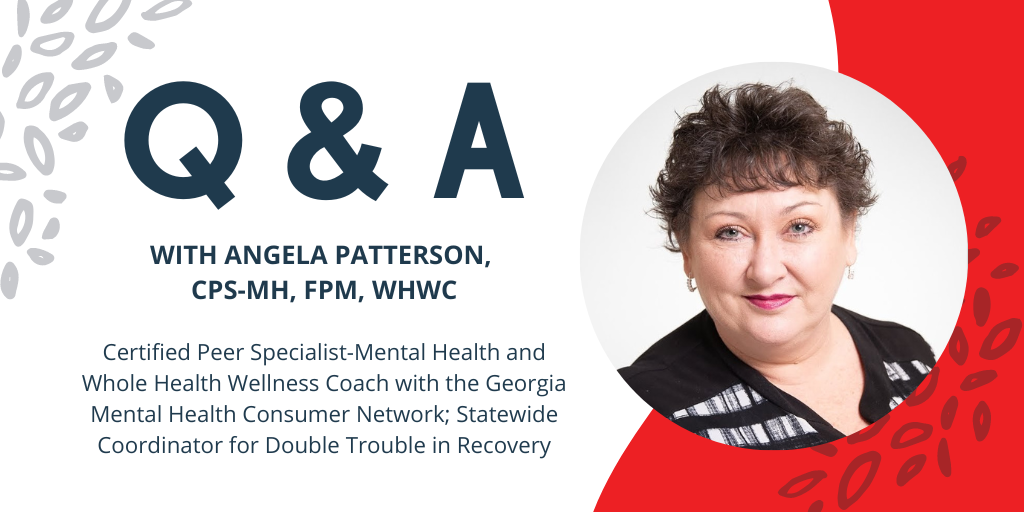Your work through the Georgia Mental Health Consumer Network (GMHCN) and National Alliance for Mental Illness (NAMI) Georgia touches on addiction recovery, mental health, wellness, and criminal justice involvement. Describe your personal journey that brought you to this work.
My early life involved trauma, and that led to problems within my family and career and eventually to alcohol misuse. I was first incarcerated when I was 17. When I was a child, I wanted to find out what was “wrong” with me and fix it, then help others. After years of cycling through jails, crisis stabilization units, and chaos, I was finally correctly diagnosed 6 years ago and started receiving the proper medication, which has helped me to live a balanced life. Programs such as peer support through GMHCN and my connection early on with NAMI led me to understand that it’s never been about what’s wrong with me. It’s about what happened to me.
A focus on whole health and wellness is sometimes overlooked in behavioral health and criminal justice programming. How do you think that behavioral health and criminal justice programs can improve a focus on overall wellness among the people they serve?
Whole health and wellness do not exist in criminal justice programs or even in the behavioral health field, necessarily. You have to define what whole health is, and it’s not about losing 20 pounds or not smoking. For me, it’s about things like managing stress, learning about what strengths I have, connecting to a support system, and challenging negative thinking. It’s also about developing certain cognitive skills. I was so excited to learn that I could change the way I thought and how my brain processed information! I use coping tools like the “3 Cs”: catch it, check it, change it. These types of strategies can be used to help people acquire a sense of purpose.
You work in a rural community. What is a unique challenge in rural communities related to service access for individuals with behavioral health conditions involved with the criminal justice system your community is working to resolve?
For people in rural communities in contact with the justice system, transportation is a huge barrier to success. Transportation is needed for required appointments with probation officers, behavioral health services, primary healthcare, grocery store trips, etc. Here in Valdosta, Georgia, there is an affordable on-demand transit program called Valdosta on Demand. There is a $2 flat rate for any trip within 15 miles and certain pick-up spots for riders.
You are trained in trauma-informed practices. In your experience, why is it important for peer specialists or peer mentors to be trauma informed?
Peer mentors have to be trauma-informed so that we don’t re-traumatize others or allow those we’re working with to re-traumatize themselves. But re-traumatization happens in the system. There is a behavioral health workforce shortage in rural Georgia—the typical wait time for accessing services is around 3 months. There is also high turnover. An individual may be connected with a provider only to have their following appointment with a whole new provider. People don’t get the services they need, and it hurts to tell the story over and over without the proper support.
We’re also trying to change the language we use across the board because language itself can be traumatizing. We’ve changed our literature to be gender inclusive, trauma informed, and person centered. We are even looking to change our program name from Double Trouble in Recovery (DTR) to something more trauma-informed like “Dual Recovery.”
DTR is a 12-step fellowship of people who share their experiences, strength, and hope with each other so that they may solve their common problems and help others to recover from their particular substance use and behavioral health challenges.
DTR is designed to meet the needs of the dually diagnosed and is for those who have been diagnosed with a psychiatric disorder. The DTR meeting format is similar to other 12-step meetings. Meetings typically last 1 or 1.5 hours. Participation is entirely voluntary, though visitors and newcomers are given the opportunity to introduce themselves. The facilitators of DTR meetings organized by the GMHCN are also dually diagnosed, have between 6 and 22 years in recovery, and are encouraged to take care of their mental health and work on their own personal recovery.
What are three things you feel are most helpful for you personally in maintaining wellness on an everyday basis?
My biggest one is my connection to others in recovery and my higher power. I have improved the quality of my connections because not only do I not isolate myself, but I also have immersed myself in a culture of recovery through support groups. Being part of a support group lets me see that everyone has a similar struggle. I’m not alone.
The second thing is my Wellness Recovery Action Plan (WRAP), which includes things like keeping a daily routine, listening to music, playing with my dogs, journaling, and keeping it real with my support team. This includes a daily personal inventory and quickly admitting when I have not been completely honest or forthcoming. For too many years, secrets kept me sick. I tell on myself today!
The third most helpful thing is maintaining my wellness through self-care. I take time for myself, and I meditate. Meditation is about getting to know me and figuring out what I want and what do I want in life. And finally, I know I’m on the right road. My daughter, who I had abandoned in addiction for 8 years, says she got back both her mom and her best friend. I feel like, for the first time in my life, I’m walking in my own shoes. I don’t put on stilettos for you to look at me anymore. I wear Skechers and I walk in comfort.
Like what you’ve read? Sign up to receive the monthly GAINS eNews!


